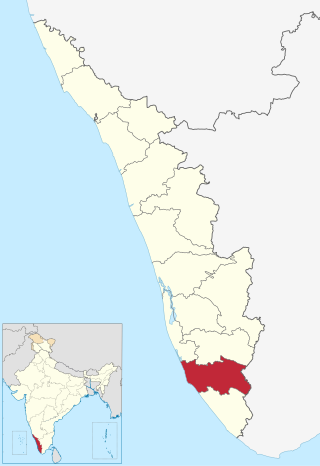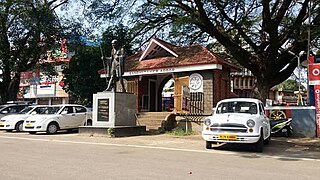
Pathanamthitta District, is one of the 14 districts in the Indian state of Kerala. The district headquarters is in the town of Pathanamthitta. There are four municipalities in Pathanamthitta: Adoor, Pandalam, Pathanamthitta and Thiruvalla.

Kollam, is an ancient seaport and the fourth largest city in the Indian state of Kerala. Located on the southern tip of the Malabar Coast of the Arabian Sea, the city is on the banks of Ashtamudi Lake and is 71 kilometers northwest of the Thiruvananthapuram. Kollam is one of India's oldest continuously inhabited cities, with evidence of habitation stretching back to the megalithic; the city has also been a maritime entrepôt millennia, the earliest attestation of which dates back to the Phoenicians and Romans. It is the southern gateway to the Backwaters of Kerala, and is known for its cashew processing, coir manufacturing, and tourism industries.

Punalur is a municipality in the Kollam district of Kerala, India. It is the headquarters of the Punalur Taluk and Punalur Revenue Division. It is situated in the eastern part of the Kollam district of Kerala, on the banks of the Kallada River and foothills of the Western Ghats. It is about 45 kilometres (28 mi) north-east of Kollam and 68 kilometres (42 mi) north of Thiruvananthapuram.

Kollam district, is one of 14 districts of the state of Kerala, India. The district has a cross-section of Kerala's natural attributes; it is endowed with a long coastline, a major Laccadive Sea seaport and an inland lake. The district has many water bodies. Kallada River is one among them, and land on the east bank of the river is East Kallada and that on the west bank is West Kallada.

The Diocese of Quilon is a Latin Church ecclesiastical jurisdiction or diocese of the Catholic Church based in the southern Indian city of Kollam. It is a suffragan in the ecclesiastical province of the metropolitan Archdiocese of Trivandrum. The Diocese of Quilon covers an area of 1,950 km2 that contains a population of some 4.8 million. At least 4.8% of the people in the area are Catholic.

Adoor is a municipality in the Pathanamthitta district of Kerala, India. It is the headquarters of the Adoor Taluk and Adoor Revenue Division. Adoor is located 18 km (11.2 mi) southwest of the district headquarters Pathanamthitta and 85 km (52.8 mi) north of the state capital Thiruvananthapuram.

The Kallada River is the longest river in Kollam District, Kerala, India. The river originates in Kulathupuzha, in the Western Ghats, and flows west, reaching the Arabian Sea after traveling a distance of 120 km (75 mi).

Aryankavu is a village located in the Kollam district of the Indian state of Kerala. It lies close to the border between Kerala and Tamil Nadu near Thenmala. It is also one of the famous pilgrimage sites associated with the legend of Sabarimala. The village is located beside Shendurney Wildlife Sanctuary.

The Metropolitan Archdiocese of Trivandrum is a Latin Church ecclesiastical territory or archdiocese of the Catholic Church. Its episcopal see is Thiruvananthapuram in Kerala, India. It shares its see with the major archeparchy of the Syro-Malankara Catholic Church, the Major Archeparchy of Trivandrum. The archdiocese a metropolitan see of an ecclesiastical province with four suffragan dioceses.

The Roman Catholic Diocese of Punalur is a diocese located in the city of Punalur in the ecclesiastical province of Trivandrum in India.
Hinduism, Islam and Christianity are the prominent religions in Kollam district. As per the Census 2011, out of the total population of 2,635,375 persons, 64.42% follow Hinduism, 19.30% follow Islam and 16.00% follow Christianity. Other religions comprise 0.04%, while 0.25% did not state any religion.

Stanley Roman is an Indian prelate of the Catholic Church. He was Bishop of Quilon, India, from 2001 to 2018. He also chaired the education committee of the Kerala Catholic Bishops' Council.
St Andrew's Church, Kovilthottam is a historic colonial-era Roman Catholic church that is located in the Panmana–Chavara panchayat, Karunagappalli taluk, Kollam district, Kerala, India.

The Infant Jesus Cathedral is a historic Roman Catholic church established by Portuguese during 1614, situated at Tangasseri in the city of Quilon (Kollam), India. It is now the cathedral i.e the Seat of the Bishop of Roman Catholic Diocese of Quilon, the ancient and first catholic diocese of India. The Church remains as a memento of the Portuguese rule of old Quilon city.

Transport in Kollam includes various modes of road, rail and water transportation in the city and its suburbs. State-owned Kerala State Road Transport Corporation buses, private buses, Indian Railways, state-owned Kerala State Water Transport Department boats & ferry, taxis and auto rickshaws are serving the city of Kollam. The city had a strong commercial reputation since the days of the Phoenicians and Romans. Ibn Battuta mentioned Kollam Port as one of the five Indian ports he had seen during the course of his twenty-four year travels.

St. Mary's Cathedral is one of the oldest church of the Ranchi, in the Chota Nagpur Plateau area. Catholics and Christian faithful working as tea gardens in Tea Estates area, Railway along with the farmers were the early community of the church.

The Kollam Orthodox Diocese, one of the 32 dioceses of the Malankara Orthodox Syrian Church, was created after the Mulanthuruthy Synod in 1876. H.G. Dr. Joseph Mar Dionysius is the Metropolitan of the diocese, whose head office is in Bishop's House, Cross Junction, Kadappakada, Kollam, Kerala, India.

The Latin Catholics of Malabar Coast, also known as Malabar Latin Catholics or Latin Christians of Kerala are a multi-ethnic religious group in Kerala adhering to the Roman Rite liturgical practices of the Latin Church, on the Malabar Coast, the southwestern coast of India. Ecclesiastically, they constitute the ecclesiastical provinces of Verapoly and Trivandrum. They are predominantly Malayali people and speak the Malayalam language, though a subgroup of Luso-Indians speaks the Cochin Portuguese Creole. They trace their origins to the evangelization of Malabar Coast by the Dominican, Franciscan, Jesuit and Carmelite missionaries, mainly French and Portuguese.





















